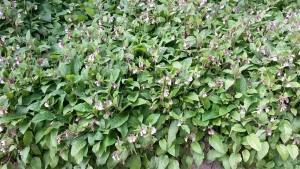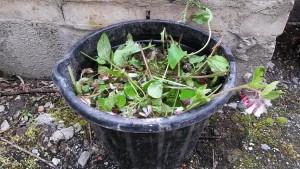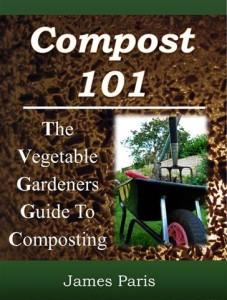How To Make FREE Plant Food
If you are using store-bought fertilizer to feed your plants, then in my opinion you are just throwing away money that could be usefully spent elsewhere! Natural food for plants is all around us. It’s free, abundant, and produces excellent crops or blooms with very little effort.
Natural, easy to aquire feed is available in several forms, from animal manure to ‘green’ manure. most of which require little in the way of preparation or hassle. However as with most gardening exploits, a little effort is usually required 🙂
Here are some top organic feeds called ‘teas’ that are simple to prepare, cheap or free to make, and very effective.
Organic Tea:
Organic tea is simply a term given to an organic feed that has been produced by infusing water with various plants to produce a tea-like liquid.
As a general rule it is better to use rain water collected in a rain barrel or similar. Pond water works great also as it is already teaming with micro-organisms – ideal for the process described in the later section.
All of the teas follow the same general rule. When ready dilute by pouring an inch or so into a watering can or pail then top up with water. You are aiming for a mix around 15-1 water to tea mixture.
Apply about once per week in the early growth period, then increase to twice per week especially for heavy fruiting varieties.
As your tea ‘brews’ over the coming season add a little more water and organic material as needed. Don’t worry when the water becomes brackish and a bit smelly when mixed – the plants love it!
As an alternative to just throwing the organic material into a pail of water, you can choose to put it in a netting sack beforehand so that the liquid is free of bits & pieces of material. However I never bother with this and just add the liquid as it comes – bits and all 🙂
As a rule, remove the roots from material added to the tea mix.
Comfrey Tea:

The comfrey plant makes a first-class tea for growing vegetables as it is packed full of Potassium, nitrogen, and magnesium. This is makes an excellent brew particularly for fruiting plants such as tomatoes , cucumber, melons, courgette, etc.
, cucumber, melons, courgette, etc.
Simply cut a large bunch of comfrey and place into a pail so that it is about ½ full. Top up the pail with water and cover over. Leave for at least a week before use.
When ready dilute by pouring an inch or so into the watering can then topping up with water. You are aiming for a mix around 15-1 water to tea mix.
Nettle Tea:
This tea does not contain much in the way of phosphates, but has usable amounts of nitrogen, iron, and magnesium. After donning heavy gloves to avoid the stinging nettles! Choose young plants without seeds or roots and put a large clump into a pail. Chop up with sheers and ¾ fill the pail with water . Stir thoroughly and leave to mature for 5-10 days.
Grass Cuttings Tea:
Instead of adding all your grass cuttings to the compost heap (I hope you are doing this!) Save some for a nitrogen-rich tea. Follow the same procedure for nettle tea. This teas is quick to make and is usable within 3-5 days.
Best not kept for more than 2 weeks or so unless you are happy with a really stinky brew! Since grass cuttings are usually plentiful around gardeners, and this brew is quick to make, the ‘topping up’ process of the other organic teas can be skipped in this case.
Weed Tea:
What gardener does not have to deal with weeds on a regular basis? Ok, I’ll make an small exception for Raised Bed or Straw Bale gardeners!
Now however apart from the compost heap, weeds can be re-directed to the organic ‘tea-pot’. Just add any common weeds such as stinging nettles, dandelions, buttercup etc, and any green cuttings to a pail of water and leave for 7-10 days to infuse.
Top up as needed with material and water to make a good all-round organic feed for vegetables or blooms.
Compost Tea:
Place mature compost into a large drum, filling about half way. Fill to the top with water. Stir thoroughly then let this mix brew for a period of 5 days or so, then strain of the compost and add the liquid to the base of the plants.
Manure Tea:
If you have access to animal manure – herbivore only – then you have access to a rich source of nutrients for your plants.
Manure from farm animals such as horse, sheep or rabbits makes excellent nutrient rich tea. With other farm-yard animals such as chickens, cow or pig, it is best to compost the manure first for at least a year before use. This is to ensure the destruction of harmful pathogens and also (in the case of chicken manure) to reduce nitrogen content to usable levels.
Manure tea makes an excellent feed for fruiting plants, and a great soil conditioner, that will feed the soil over the long term.
Add about 1/3rd manure to a pail and top up with water. Leave to infuse for 10 days before use. Top up with water and manure as the season progresses.
Safety Precaution – Be aware that E coli and other harmful bacteria can be present in any manure and so must be handled with due care. Do not feed compost or manure tea to plants where the edible part lies on the ground – i.e. strawberries, cucumber, marrow etc. And stop using 3 weeks before vegetables are to be harvested.
In my view there is really no need to buy expensive fertilizer for your vegetables or even house plants. As the examples above show clearly, an abundance of nitrogen and mineral rich fertilizers are within easy reach of most people – and absolutely free!
Check out the Compost 101 book for some fantastic ideas to make your own fertilizers from compost and other organic material just lying around waiting to be put to good use.


